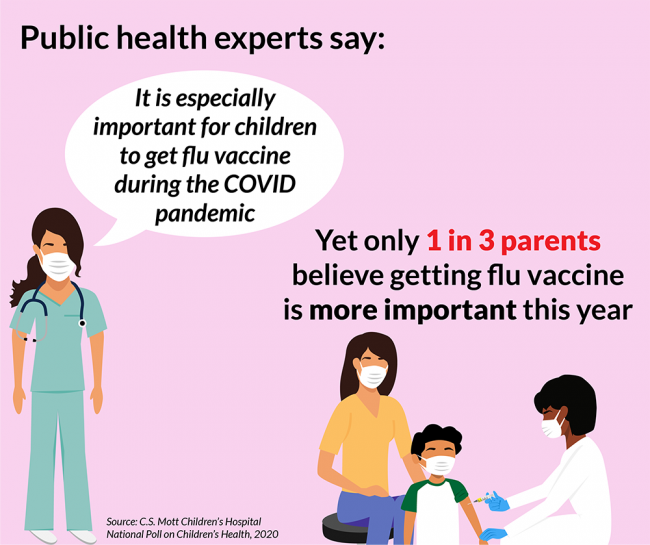Flu vaccine for children in the time of COVID


Flu vaccine for children in the time of COVID
Public health experts have emphasized that during the COVID pandemic, it is important for people of all ages to get seasonal flu vaccine this year. In August 2020, the C.S. Mott Children's Hospital National Poll on Children's Health asked a national sample of parents about getting flu vaccine for their children age 2-18 years.
Two-thirds of parents intend to have their child get flu vaccine this year (49% very likely and 19% likely). Parental intention regarding flu vaccine this year is slightly lower for parents of teens compared to younger children (73% for 2-4 years, 70% for 5-12 years, and 65% for 13-18 years).
Among parents who said their child got flu vaccine last year, nearly all (96%) intend to have their child get flu vaccine this year. In contrast, among parents whose child did not get flu vaccine last year, only 28% say their child is likely to get flu vaccine this year.
One-third of parents (34%) believe that having children get flu vaccine is more important this year compared to other years; 8% say it is less important, and 58% say it is about the same. Parents who believe flu vaccine is more important this year are more likely to intend for their child to get the vaccine (94% more important vs 55% same/less important).
Only 44% of parents say their child's regular health care provider strongly recommends that their child get flu vaccine this year, and 23% say the provider recommends it; one-third of parents do not recall a provider recommending their child get flu vaccine this year. Among parents who report their child's provider strongly recommends flu vaccine this year, 92% intend for their child to be vaccinated, compared to 62% of those whose provider recommends and 40% who do not recall a provider recommendation to get flu vaccine this year.
Among the 32% of parents who say their child is unlikely to get flu vaccine this year, the most common reasons include concerns about side effects from flu vaccine (42%) and belief that flu vaccine is not necessary (40%) or effective (32%). Fourteen percent will not seek flu vaccine because they are keeping children away from health care sites due to COVID; 9% say their child is afraid of needles or does not want to get flu vaccine.

Highlights
- Only 1 in 3 parents believe it is more important for their child to get flu vaccine this year compared to previous years, despite public health recommendations.
- Among parents who will not seek flu vaccine for their child this year, 1 in 7 say they are keeping their child away from health care sites due to concerns about COVID.
- Less than half of parents say their child's regular health care provider strongly recommends flu vaccination this year.
Implications
Public health experts have emphasized the particular importance of flu vaccination during the COVID pandemic as a tool to limit the stress on health care systems. This includes reducing the number of influenza-related hospitalizations and doctor visits, and decreasing the need for diagnostic tests to distinguish influenza from COVID. Children should get flu vaccine to protect themselves and to prevent the spread of influenza to family members and others.
Results from this Mott Poll indicate that not all parents are hearing this message: only 1 in 3 parents said it's more important for their child to get flu vaccine during this pandemic year than in a regular year. Among parents who believe flu vaccination is more important this year, nearly all intend to have their child vaccinated. However, most parents in this group reported their child also received flu vaccine last year. This may be reaching the segment of parents who were already aware that children are recommended to get flu vaccine every year and have established a pattern of doing so.
A key challenge for public health officials is how to reach parents who do not seek annual flu vaccination for their child. In this poll, among parents whose child did not get flu vaccine last year, only 28% indicated their child is likely to get flu vaccine this year. When annual flu vaccination is not a pattern, parents need to be prompted to think about why their child needs flu vaccine, and when and where to get it.
Typically, child health providers guide parents on what vaccines children should receive, yet less than half of parents indicated their child’s doctor strongly recommends flu vaccine for this year. Some providers focus their discussion on the specific vaccines that will be given during that day’s office visit; this works well for vaccines given on an age-based timeframe, but precludes discussion of flu vaccine for children who are not scheduled for office visits during flu vaccine season. This poll indicates that child health providers may need to give proactive guidance about flu vaccine during visits in the spring and summer.
Another barrier is the impact of COVID on the health care delivery system. Many practices have limited in-person visits, with increased use of telehealth. These changes in care may reduce the amount of time that parents spend talking with the provider and staff, impeding their ability to ask questions about flu vaccine safety and effectiveness, which are significant concerns for many parents.
For some parents, COVID also has a negative impact on their willingness to bring their child to a health care setting - for flu vaccine or other services - due to concerns about being exposed to COVID. Most child health providers have made changes in their office environment and protocols to keep children and parents safe when they come in for office visits or vaccines. Some practices are even offering drive-through vaccination. Parents who are concerned about COVID exposure should contact their child's provider to learn about what types of precautions have been put in place.
Given the results of this Mott Poll, child health providers should pursue multiple strategies to emphasize the importance of flu vaccine during this COVID pandemic. Providers should make it a point during all in-person and telehealth visits to clearly state their recommendation for all children older than 6 months to get flu vaccine. In addition, providers may send reminder postcards or add a banner message to their practice website to emphasize the importance of children getting flu vaccine during this pandemic year. Reminder notices and website information should outline changes to practice operations so that parents feel safe bringing children in for vaccination and other services.
Some children, particularly teens, receive flu vaccine outside of their usual health care provider office, and many retail pharmacies are expanding their flu vaccine services to children during the pandemic. Parents who are unable to get flu vaccine appointments at their child's usual health care provider should contact a local pharmacy to find out the specific ages and times that flu vaccinations are available for children.

Data Source & Methods
This report presents findings from a nationally representative household survey conducted exclusively by Ipsos Public Affairs, LLC (Ipsos) for C.S. Mott Children’s Hospital. The survey was administered in August 2020 to a randomly selected, stratified group of adults who were parents of at least one child age 0-18 years living in their household (n=2,027). Adults were selected from Ipsos’s web-enabled KnowledgePanel® that closely resembles the U.S. population. The sample was subsequently weighted to reflect population figures from the Census Bureau. The survey completion rate was 60% among panel members contacted to participate. This report is based on responses from 1,992 parents who had at least one child age 2-18 years. The margin of error for results presented in this report is ±1 to 5 percentage points.
Findings from the C.S. Mott Children’s Hospital National Poll on Children’s Health do not represent the opinions of the University of Michigan. The University of Michigan reserves all rights over this material.
Citation
Clark SJ, Gebremariam A, Schultz SL, Singer DC, Freed GL. Flu vaccine for children in the time of COVID. C.S. Mott Children's Hospital National Poll on Children's Health, University of Michigan. Vol 37, Issue 1, September 2020. Available at: https://mottpoll.org/reports/flu-vaccine-children-time-covid.



